Locals in one of Britain’s most popular tourist hotspots have warned the second home tax could cause an exodus of yearly visitors which could be disastrous for the local economy.
In April this year, the Isle of Wight became one of a number of local authorities to begin charging 100 per cent council tax premiums on second homes.
The hike means that second home owners on the island will pay between £3,155 and £9,500 a year in tax for their properties.
The council estimated the new levy would raise around £5million to help fund local services.
While some areas of the country such as Devon and Cornwall have urged their residents to ‘fight back’ against out-of-towners, the Isle of Wight locals have more sympathy with their come-and-go neighbours.
The quaint villages of Bembridge and Seaview have become highly sought after destinations for second home owners.
An influx of wealthier visitors who return year-on-year has allowed more independent businesses, boutiques and restaurants to survive.
Bembridge has around 250 second homes, making up nearly 11 per cent of all properties.
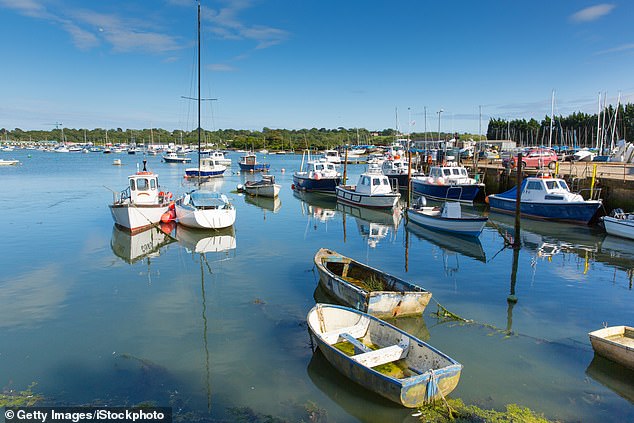
Bembridge is one of the most popular villages for second homes on the Isle of Wight. Pictured: Bembridge Harbour
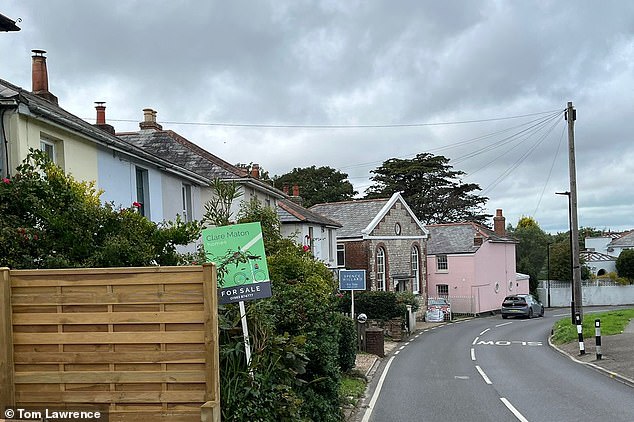
Bembridge on the Isle of Wight has around 250 second homes, with many already deciding to sell after taxes increased by 100 per cent
The village, which locals proudly claim is the ‘largest village in Europe’ has welcomed its temporary residents for many years, but now many may be forced to sell their homes and possibly never return.
At a local fishmongers on the High Street, owner Ruth Curtis said that the yearly influx of tourists returning to their homes has created an environment where businesses like hers can thrive.
She told the Daily Mail: ‘One of the reasons that Bembridge has so many nice food shops is an influx of holidaymakers and second home owners during July and August. So it has a big effect.
‘A lot of the second homes here are generational homes, where they are passed down through family members. If they leave it could become very detrimental.
‘Somewhere like Bembridge and the island which is very second home dependant, it could have a massive effect.’
Locals said that while many owners of the homes may only visit a few times each year, many then choose to use their properties as holiday lets, bringing even more visitors to spend money in the local economy.
Roger Munns is the owner of Wight Coast Holidays, which operates 25 holiday homes in Bembridge and Seaview.
He said the second home tax has already had an affect on his business, with three home owners already deciding to sell their properties.
He said: ‘We have had three owners who decided to put their properties up for sale because of the double rates.
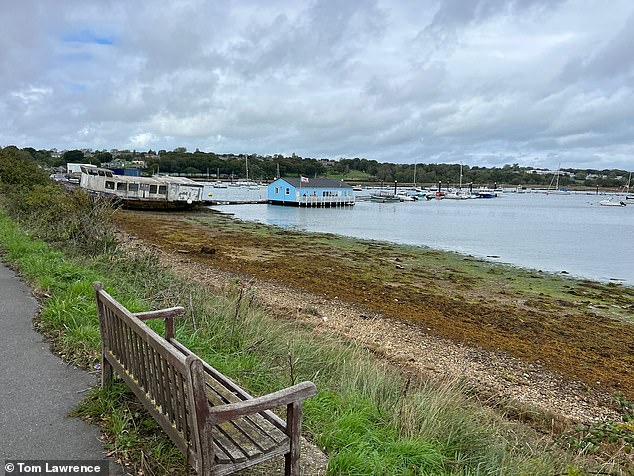
The picturesque and quiet Bembridge harbour is a hotspot for visitors from other parts of the UK
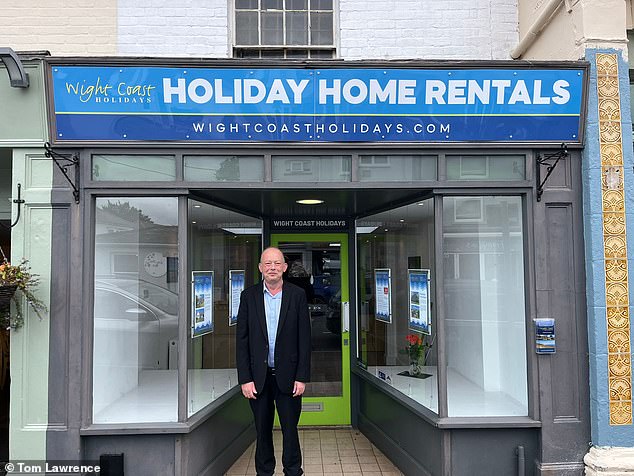
Roger Munns owns Wight Coast Holidays, a holiday rental business operating in Bembridge
‘The property market is very slow and there is almost a glut of properties compared to the old days.
‘We wont carry on marketing the holiday homes in case they are sold, because then we have to cancel people’s holidays. They want to carry on but we cant.
‘But we have had some more come on now because second home owners who haven’t previously let their holiday homes are doing it to pay for the rising costs.’
Mr Munns said that the holidaymakers who visit the properties each year are vital for the local economy.
He added: ‘Holidaymakers spend a lot more per week than local residents do. They go out for dinner, buy things locally. They don’t have a negative impact on the village.
‘In Seaview, it is almost like Cornwall and Devon where the villages are empty outside the season because of the amount of second home owners.
‘Before the pandemic we used to advise owners to put their rates up above the rate of inflation, if they had a good year, we did it that way for years. Now we are advising them to keep the rates the same year on year.
‘They have all gone along with it but they are not making any more money because the rates have doubled.
‘If they did put their rates up, say five or ten percent, it only takes two or three weeks with no bookings for them to be down.’
In seaside towns across the country there has been many who have bemoaned second home owners for turning their areas into ‘ghost towns’ and have called for locals to move in and take their place.
However on the Isle of Wight the areas with the most second homes are often more affluent, with less affordable properties being the ones snapped up by mainland Brits.
Cafe owner Richard de Carpentier, 35, said he believes this means the tax may not have so much of a big impact.
He said: ‘I am not sure how much of a difference it will make because a lot of the houses are high end, they are expensive.
‘So if people have already bought million pound houses then I am not sure a few hundred quid will make a difference.’
Richard started his business in Bembridge two years ago and has managed to build up a strong base of year-round customers.
However he still admitted that second home owners in the village were a big part of the yearly tourist trade which local businesses depend on.
He added: ‘On the island, it could definitely affect tourism. It is not just the second home tax but the cost of the ferries and actually getting over at the moment.
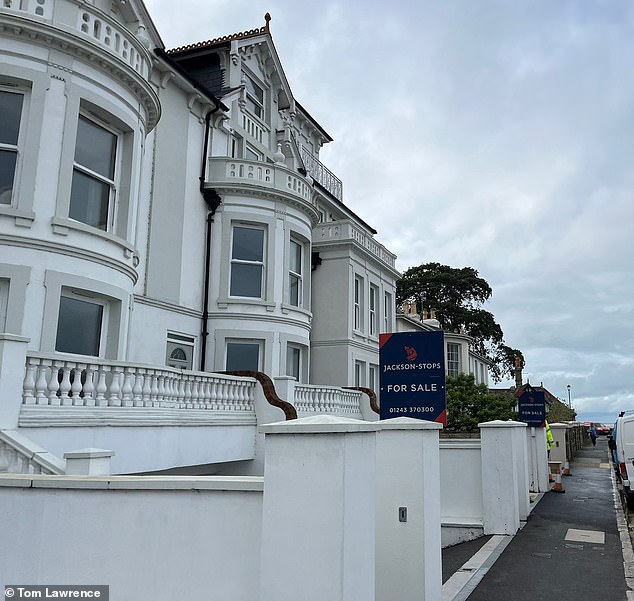
Seaview has the highest percentage of second home owners on the Isle of Wight, making up nearly 22 per cent of properties
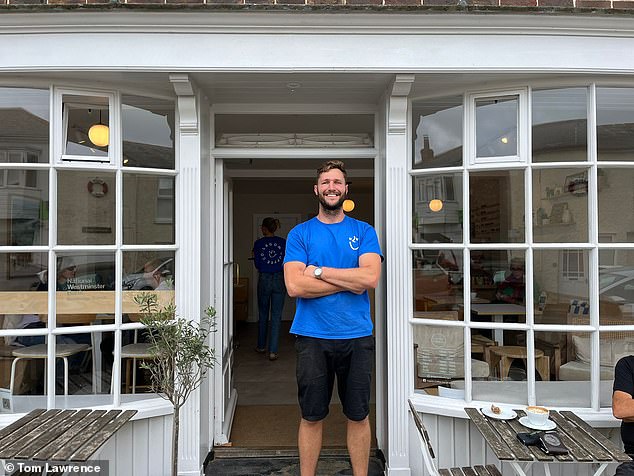
Cafe owner Richard de Carpentier was concerned that the homes vacated by second home owners may not be affordable for locals
‘Bembridge is a vibrant community with a lot going on. There are quite a few streets with a lot of second homes.
‘We don’t hear about it in the cafe but I have heard people speaking about it down the pub.
‘The Isle of Wight would not be so vibrant without the trade in the summer, tourism, including people with second homes.’
Just four miles away the village of Seaview near Ryde has the highest proportion of second homes, with nearly 22 per cent of properties not owned by a local.
Situated close to ferries from the mainland in Ryde and Fishwater and with its sweeping sandy beaches, it was recently named as the most popular domestic destination for a summer holiday by Tripadvisor’s Summer Travel Index 2025.
On the seafront, the Seaview Yacht Club has attracted sailors from around the country for more than 100 years.
The Isle of Wight hosts the world’s largest sailing regatta each year in Cowes, attracting thousands of wealthy boat owners each year, with many owning a second home near the sea to make the regular visits worthwhile.
The club’s treasurer James Crofts said a large proportion of the club’s members are second home owners in Seaview and admitted that many are not happy by the council tax hike.
He said: ‘A large part of our membership driven by memberships and subscriptions.
‘If there are punitive and additional taxes locally that may impact the retention of people living in Seaview or having second homes here, then we hear about it.
‘The reasons why people stop becoming members – there are two main reasons. One is not coming to the isle of wight or selling up and leaving. The second is the cumulative cost of coming to the island, additional taxes and the cost of the ferries.
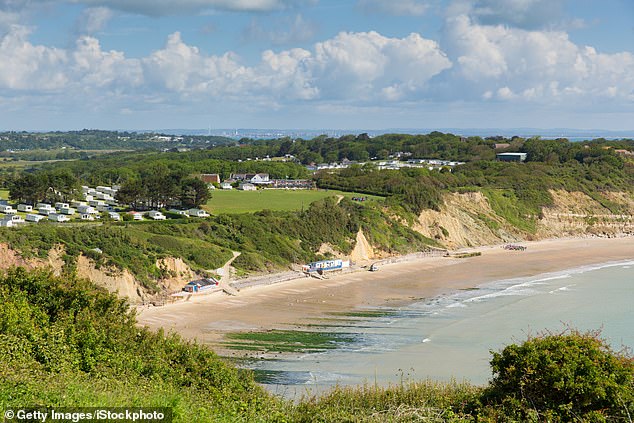
Rising costs are forcing some owners to consider selling their Isle of Wight properties. Pictured: Whitecliff Bay near Bembridge
‘I used to work for ten years in tourism here – I used to be the manager of Robin Hill Country Park. It has been in decline for five years. There was a boom during coronavirus and a boom for housing in the island and that has receded and people are thinking twice about having second homes.’
While many have chosen to purchase a holiday home on the island, there are others who have inherited a family home from a relative and have become second home owners not out of wealth, but out of a desire to remain connected to the area.
For James, this creates another problem caused by the tax.
‘I think you have to look at second homes with some context. Yes there are people that have a primary residence in the Home counties who are affluent enough to be able to afford a second home somewhere like here.
‘But you also have people whose families owned homes in the area, they may have inherited a home from the grandparents.
‘Those people may not be from the island but may have a really strong family link.
‘There may be generations of home ownership that now make them second homes but they aren’t intrinsically purchased for the purpose of being a holiday home.
‘There is already an issue for the Isle of Wight in that there is a big socio-economic disparity between some areas of the island than others.
‘People will leave the island for lots of reasons and the pull back to the island is not that strong to come back. That pull will be even less strong if people lose their generational roots to the isle of wight in the first place.
‘Also if homes become available to other people to purchase, they are not going to be in the price bracket, certainly here, that is attainable by locals. It will be second home owners, but it will just change the demographic to the next tier of affordability.’
Despite his concerns, when asked if he thinks the decision by the council was wrong, he still said no.
‘I think the council has been cash strapped for some time’, he said, ‘if you want to broadly keep amenities and services levels running, additional funds have to come from somewhere.
‘It is probably not going to be easy to find that without hurting locals. So this is an easy win I think, but not one that a lot of people here are happy about.
‘Taxes will go up and they will continue to go up, I think, in the next budget.’
Manager of the Boat House pub in Seaview, Charlotte Barton, 36, said she has regular customers who own second homes but visit the island often.
She said: ‘People are talking about it.
‘It could affect businesses. Yes the summer trade is better because people come to their second homes, but in the winter it isn’t as busy.
‘Maybe people living here all year round would make it busier all year round
‘We have a lot of locals who don’t live here full time, they stay in their second homes and if they are not here, they let them out.
‘I wouldn’t say there has been a massive change, people know they are going to have to pay extra.
‘I do think it is unfair they have to pay 100 per cent more, but homes for people who live on the island is also important. But of course we don’t know how affordable those will be. I am kind of on the fence.’
A spokesperson from the Isle of Wight Council said there is no evidence that the second home tax would affect tourism.
They added: ‘We do understand that the new council tax premium on second homes has raised concerns, particularly regarding tourism and housing affordability. These matters were carefully considered before the decision was taken.
‘The housing market is a single, interconnected ladder. Every property — whether it is a rental, a family home, or a second home — forms part of the Island’s overall housing stock.
‘When people move, they create chains: a downsizing couple frees up a larger home, a family moving on releases a starter home, and when a second home is sold, it re-enters the housing system for others to buy or rent. Each property, including those used as second homes, plays a role in how Islanders move up and down the housing ladder.
‘The challenge arises when homes are left largely unoccupied. This reduces the number of properties available to Islanders trying to get on or progress along the ladder.
‘We fully value the contribution of second-home owners and visitors to the Island’s economy. Tourism is vital to our prosperity and will remain so. However, our duty is also to ensure that Islanders have access to homes they can afford, in communities they support year-round.
‘Revenue raised from this measure will be reinvested into local services and housing priorities, helping to create a more balanced housing market that serves both residents and the wider economy.’
Cllr Phil Jordan, Leader of the Isle of Wight Council said: ‘Second homes are part of the Island’s housing ladder, and when they sit empty they limit opportunities for local people who need them.
‘This policy makes sure second homes contribute fairly, while helping to secure a housing market that works for residents and the wider economy.’












